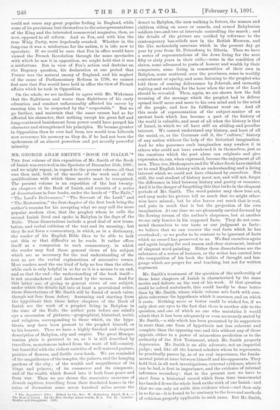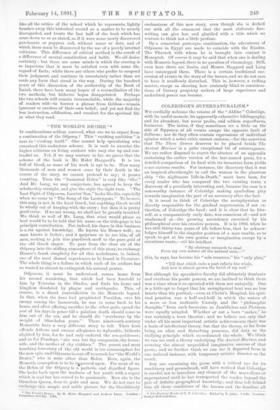MR. GEORGE ADAM SMITH'S "BOOK OF ISAIAH." THE first volume
of this exposition of Mr. Smith of the Book of Isaiah was reviewed in the Spectator of December 15th, 1888 ; and we might repeat, in regard to the present volume, all that was then said, both of the merits of the work and of the -qualifications with which those merits must be recognised. The present volume is an exposition of the last twenty- aix chapters of the Book of Isaiah, and consists of a series of dissertations in four books, under the heads of " The Exile," 4‘ The Lord's Deliverance," " The Servant of the Lord," and " The Restoration," the first chapter of the first book being the author's reasons for his accepting what we may call the more popular modern view, that the prophet whom he calls the -second Isaiah lived and spoke in Babylon in the days of the Exile. These dissertations include a good deal of new trans- lation, and verbal criticism of the text and its meaning ; but they do not form a commentary, in which, as in a dictionary, the reader of his English Bible likes to be able to look ‘out this or that difficulty as he reads. It rather offers itself as a companion to such commentary, in which the reader may find those general views of his subject which are as necessary for the real understanding of the text as are the verbal explanations of successive verses. Most readers need the one kind of help no less than the other, while each is only helpful in so far as it is a means to an end, and so that the end—the understanding of the book itself— is not overshadowed and darkened by the means. And for this latter use, of giving us general views of our subject, under which the details fall into at least a provisional order, these dissertations of Mr. Smith will be found of much value, though not free from defect. Assuming and starting from the hypothesis that these latter chapters of the Book of Isaiah are the work of a prophet living in Babylon in the time of the Exile, the author puts before our mind's eye a succession of pictures,—geographical, historical, social, and religious, corresponding to those which, on the hypo- thesis, may have been present to the prophet himself, or to his hearers. Thus we have a highly finished and eloquent description of Babylon, city and empire. The great Mesopo- tamian plain is pictured to us, as it is still described by travellers, monotonous indeed from the want of hill-country, but beautiful with the richest varieties of well-watered pasture, prairies of flowers, and fertile corn-lands. We are reminded 4)f the magnificence of the temples, the palaces, and the hanging gardens of the city ; of the wealth and magnificence of its kings and princes ; of its commerce and its conquests; and of the wealth which flowed into it both from peace and from war. Then we are shown the successive caravans of Jewish captives, travelling from their desolated homes in the ruins of Jerusalem some seven hundred miles across the
• The Booeitor's Bib'e. Edited by the Rev W. Robertson Nicoll, H.A. :— The Book of /main!' By the Roy. George Adam Smith, M.A. Vol II. Loudon Hodder and Stoughton, 1851.
desert to Babylon, the men walking in fetters, the women and children riding on asses or camels, and armed Babylonian soldiers two-and-two at intervals controlling the march ; and the details of the picture are verified by reference to the contemporary bas-reliefs now in the British Museum, and the like melancholy caravans which in the present day go year by year from St. Petersburg to Siberia. Then we have a series of representations of the Jews living for the next fifty or sixty years in their exile,—some in the condition of slaves, some advanced to posts of honour and wealth by their conquerors, some living in communities of their own in Babylon, some scattered over the provinces, some in worldly contentment or apathy, and some listening to the prophet who told them of coming deliverance by Jehovah, and earnestly waiting and watching for the hour when the arm of the Lord should be revealed. Then, again, we are shown how the full meaning of the message which the prophet had to deliver opened itself more and more to his own mind and to the mind of the people, and how its fulfilment went on. And all this mode of representation of the subject-matter of an ancient book which has become a part of the history of the world is valuable, and most of all when the history is that of Israel, in which we all have still an abiding and peculiar interest. We cannot understand any history, and least of all the social, or, as the Germans call it, the " culture," history of any nation without the help of the historical imagination. And he who possesses such imagination may awaken it in others who could not have awakened it in themselves, just as the emotions which the poet alone can originate and give expression to, can, when expressed, become the enjoyment of all men. Thus, too, Shakespeare and Sir Walter Scott have enabled us to read English history with an understanding and a living interest which we could not have obtained by ourselves. But still, the real student of history must not, and will not, forget the difference in kind between history and poetry or romance. And it is the danger of forgetting this that lurks in the eloquent periods of Mr. Smith. The word-painter may show true art, and may make his picture tell us much that we might other- wise have missed ; but he also leaves out much that is real, and puts in much that is but the projection of his own imagination. At one time we are pleasantly carried forward by the flowing stream of the author's eloquence, but at another we see only fancies in his supposed facts. They do not com- mend themselves to our taste or our judgment as facts : we believe that we can recover the real facts which he has overlooked ; or we prefer to be content to be ignorant of facts which no record has preserved to us. We find ourselves again and again longing for cool reason and clear statement, instead of eloquent word-painting. Either these dissertations are the substance of a series of lectures, or the writer has carried into the composition of his book the habits of thought and lan- guage which are proper for oral teaching, but not for written argument.
Mr. Smith's treatment of the question of the authorship of these later chapters of Isaiah is characterised by the same merits and defects as the rest of his work. If that question could be solved ambulando, this could hardly be done better than by Mr. Smith, whose whole volume sets forth with com- plete coherence the hypothesis which it assumes, and on which it rests. Nothing more or better could be wished for, if we only shut our eyes to the fact that there is another side to the question, and one of which no one who maintains it would admit that it has been adequately or even accurately stated by Mr. Smith,—a side which has been presented by its supporters in more than one form of hypothesis not less coherent and complete than the opposing one, and this without any of those appeals, either to a pqwer of miraculous prediction or to the authority of the New Testament, which Mr. Smith properly deprecates. Mr. Smith is an able advocate, not an impartial judge ; and, like all the learned scholars whom he represents, he practically passes by, as of no real importance, the funda- mental point at issue between himself and his opponents. They hold that, in all such investigations, external evidence, where it can be had, is first in importance, and the evidmice of internal inference secondary : that in the present case we have to start from a historical record which from time immemorial has handed down the whole book as the work of one Isaiah : and that we can only set aside this evidence when—and then only in so far as—it is found to be contrary to the laws and methods of criticism properly applicable to such cases. But Mr. Smith,
like all the critics of the school which he represents, lightly brushes away this historical record as a matter to be merely disregarded, and treats the last half of the book which has come down to us as stated, as if it were some newly discovered parchment or papyrus roll, without name or date, and of which these must be discovered by the use of a purely internal criticism. This difference of critical method is the result of a difference of mental constitution and habit. We all desire certainty ; but there are some minds in which the craving is so imperious that it must be satisfied even with some dis- regard of facts ; while there are others who prefer to suspend their judgment, and continue in uncertainty rather than set aside any facts that stand in the way. During the hundred years of this discussion of the authorship of the Book of Isaiah, there have been many hopes of a reconciliation of the two methods, but hitherto hopes disappointed. Perhaps the two schools will remain irreconcilable, while the majority 'of readers will—to borrow a phrase from Gibbon—remain ignorant or careless of their own belief ; and yet not find the less instruction, edification, and comfort for the spiritual life in what they read.



































 Previous page
Previous page